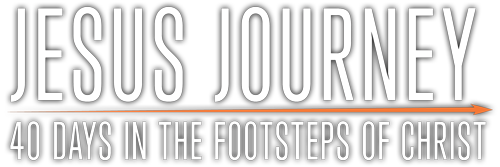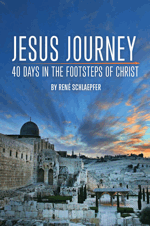Day 11
Won’t You Be A Neighbor?
Read Luke 10:25–37
We sit in a medical clinic near a church. Palm trees sway outside in the warm twilight breeze as traffic noise filters in through the open patio.
I listen as the wealthy young businessman describes life in this Muslim-majority country. When someone in our group asks him what it’s like to be a Christian here, he lowers his voice. Perhaps without even realizing it, he glances quickly toward the window.
After ten days in Israel, we have crossed the border into Jordan, where we meet several local Christians. While they’re all careful to endorse the many good works of the present government, they also admit to the pressure of being a tiny minority in their own country.
I can understand why. The secret police are always lurking here. From their perspective, they’re just trying to keep order. There’s so much potential for explosive violence in this society, with its volatile mix of religions and political loyalties, that the police monitor every organization to root out any troublemakers.
But for many Christians, the constant presence of the secret police, or mukhabarat in Arabic, can be chilling. Simple evangelism, part of the basic DNA of any believer, feels dangerous. The conversion of Muslims to Christianity is against the law in this country, so any religious conversation with anyone outside the small circle of known Christians is tinged with risk.
Even the U. S. State Department, which considers Jordan an ally, says the lack of accountability within the mukhabarat underscores “significant restrictions on freedom of speech, press, assembly and association.” It reports that agents “sometimes abuse detainees physically and verbally” and “allegedly also use torture.” 18
So what’s it like to be a Christian in a place like this?
THE HOLY HUDDLE Temptation
One Jordanian friend tells me that the temptation is to retreat to the “holy huddle,” to just hang out with other people who are like you. It’s safer. It keeps you out of trouble. It keeps you clean.
It reminds me of what was happening in the Judaism of Jesus’ time. Because of the sometimes brutal oppression of the Greek and then Roman rulers, rabbis debated the meaning of the word “neighbor” in this command from the book of Leviticus:
Do not seek revenge or bear a grudge against anyone among your people, but love your neighbor as yourself.
I am the Lord. Leviticus 19:18
Does “neighbor” include the sneering soldier, the foreigner, the enemy?
By the time of Christ, popular teaching excluded all non-Israelites from this Levitical command to love and not hate. Pharisees even excluded non-Pharisees. Other rabbis in Christ’s time said this didn’t include any personal enemies (which seems to miss the whole point, doesn’t it?). 19
So the lawyer in Luke 10 wants to know Jesus’ opinion. Who is my neighbor?
And as he almost always does, Jesus says, Let me tell you a story.
THE SURPRISING NEIGHBOR
Once upon a time, a man walked from Jerusalem to Jericho.
This 17-mile drive was notorious in ancient times. It wound through steep desert canyons, descending 3,600 miles from the high plateau of Jerusalem to the desert oasis of Jericho along the Wadi Qilt gorge. Ever hike into the Grand Canyon? Think of something like those narrow paths and you’ll have an idea of what this road was like.
Robbers wait around a sharp turn in the road. The man is robbed, stripped, beaten, and left for dead.
Then three people happen along.
First, a priest. In those days, thousands of priests worked on rotation in Jerusalem but lived in Jericho, known as the city of priests. Because this man is headed “down” the road, it’s clear he’s headed home. But he crosses to the other side of the path, stepping carefully around the body, perhaps because he can’t touch a corpse without becoming “unclean,” which would interfere with his job.
He’s focused on ceremony, on cleanliness, on career. Not compassion.
Second: A Levite, one of the thousands of clerical assistants in the temple, who also had rules against touching corpses. He too passes right by.
Third: Well, most scholars agree that Christ’s original listeners would have expected him to introduce a Jewish layperson at this point. But Jesus, the master of the plot twist, introduces a Samaritan. The most despised ethnic group in the region.
One night when Jesus was about ten, Samaritan terrorists infiltrated the Jewish Temple in Jerusalem and defiled it by scattering human bones all over the sanctuary, halting worship for quite a while until it could be ritually cleansed again.
Those Samaritans had been exacting revenge for the time a few years earlier when Jewish soldiers had destroyed the Samaritan temple.
And this cycle of attack and counter-attack had been going on for centuries.
FAMILY FEUD
Hundreds of years before this story, the Jews were conquered by the Assyrians. Most of the Israelites were taken captive and moved out of the country. But a few, especially the poorer ones, were left in Israel. They intermarried with the Assyrian soldiers to survive in the ruins. When, years later, the other Jews moved back, these people were despised, seen as collaborators. They weren’t even allowed to worship in the Temple.
So the Samaritans, as these people came to be called, said, “Fine. We’ll build our own temple.” They went to a place called Mount Gerizim, and built a house of worship there.
The tension thickened to the point where most Jews would never even eat or talk with Samaritans. They were considered heretics, deviants, blasphemers.
A Samaritan would never be the hero of a Jewish story.
But not only does this Samaritan rescue the man, he gives him shelter at an inn nearby and leaves two denarii — enough to pay for about twenty-four days at the inn — and promises to bring back more money if needed.
SURPRISE ENDING
Then, the second twist at the end of the story. I think almost everyone misses it, the way Jesus spins the lawyer’s question around on its head. The lawyer was asking, “Who is my neighbor?” But Jesus asks him, “Which of these three do you think was a neighbor to the man who fell into the hands of robbers?”
(Luke 10:36)
In other words, “neighbor” is not about the label I choose to apply to other people. “Neighbor” is a term that may or may not describe me.
The question is not who is the lawyer’s neighbor; the question is whether the lawyer is a neighbor. 20
Jesus is telling a story about the tendency of religion to degenerate into an us vs. them system; a way to distinguish the good people from the bad people; a way to socialize with the insiders and avoid unclean contact with outsiders.
CHOOSE TO BE A NEIGHBOR
In December 2000, Wheaton college professor of New Testament Gary Burge was given the remarkable opportunity to preach the sermon at Friday prayers at the influential Abu Nour Mosque in Damascus, Syria. Because the relationship between the minority Christians and the majority Muslims in Syria is often strained, he chose to speak on the parable of the Good Samaritan. He concluded:
Being a neighbor is meaningless if it refers only to those inside my religious or cultural or national circle. Being a neighbor is about courage, about taking risks; it is about walking across the road and helping — and not using religion as an excuse to stay away. 21
It is certainly a risk for Christians to do this in the Arab countries of the Mideast. The businessman we’re listening to in Jordan explains that this is why he, and many other Jordanian Christians, have opened health clinics, such as the one we’re sitting in now.
Clinics like this are designed to be places where low-income people — many of them Palestinian refugees from the West Bank — can receive free care, without any strings attached. The ones who’ve been left on the side of the road can find help here, in these places that remind me of the Inn of the Good Samaritan.
“Muslims will not read our Bibles or listen to our sermons,” one Jordanian says. “But they will see us. So the one question is, what do they see when they see us?”
Christians in every culture must consider this. Jesus continually emphasized the role of good deeds — not to earn salvation, but to show the new kind of kingdom that Christians are spreading: A kingdom of love.
Ours is not a kingdom of this world. There are no borders, no ID checks. No secret religious police. But there are ambassadors. Emissaries of the kingdom to come.
The next place I visited in Jordan gave me a stunning, border-free, God’s-eye view of the Holy Land.
Project
Think of a person or group of people you’re struggling to treat as your neighbor. “Cross the street” today and do something that demonstrates God’s love to that person or group of people.

 Buy Jesus Journey at Amazon.com
Buy Jesus Journey at Amazon.com